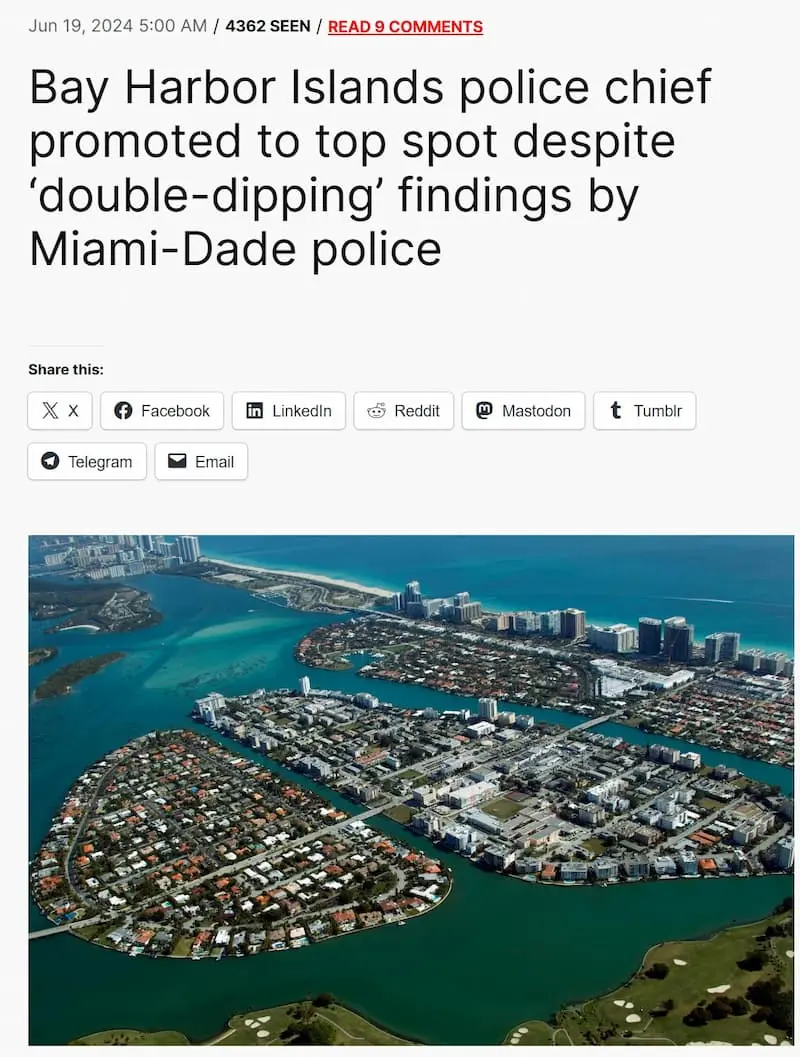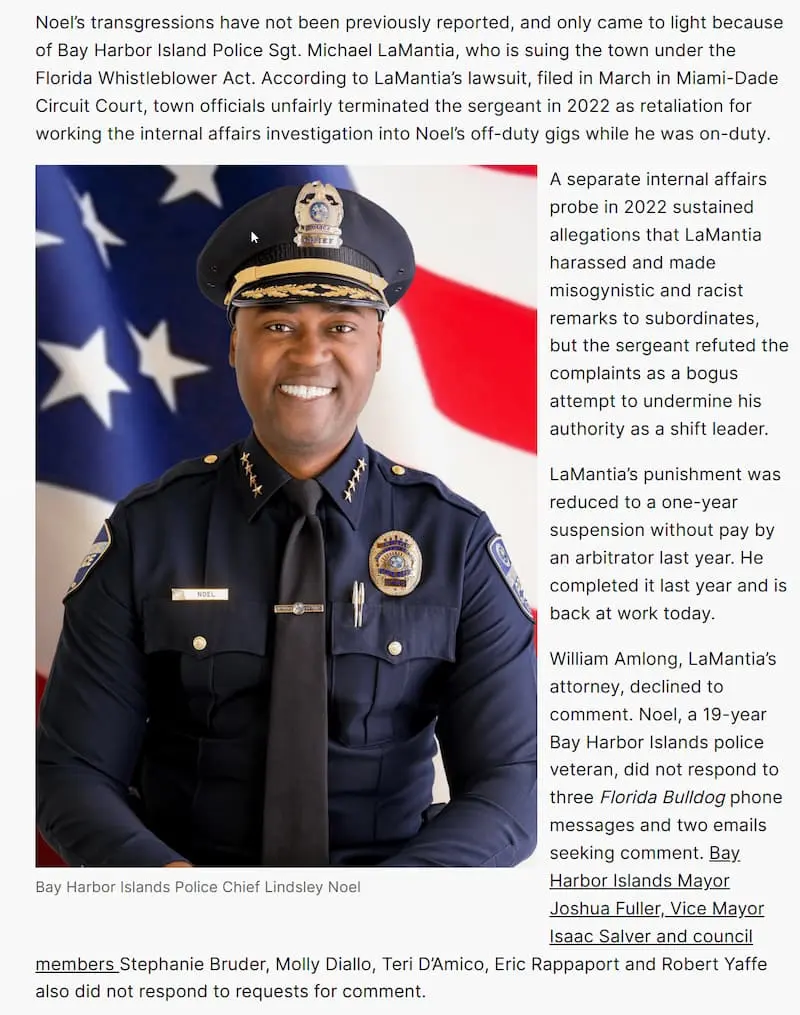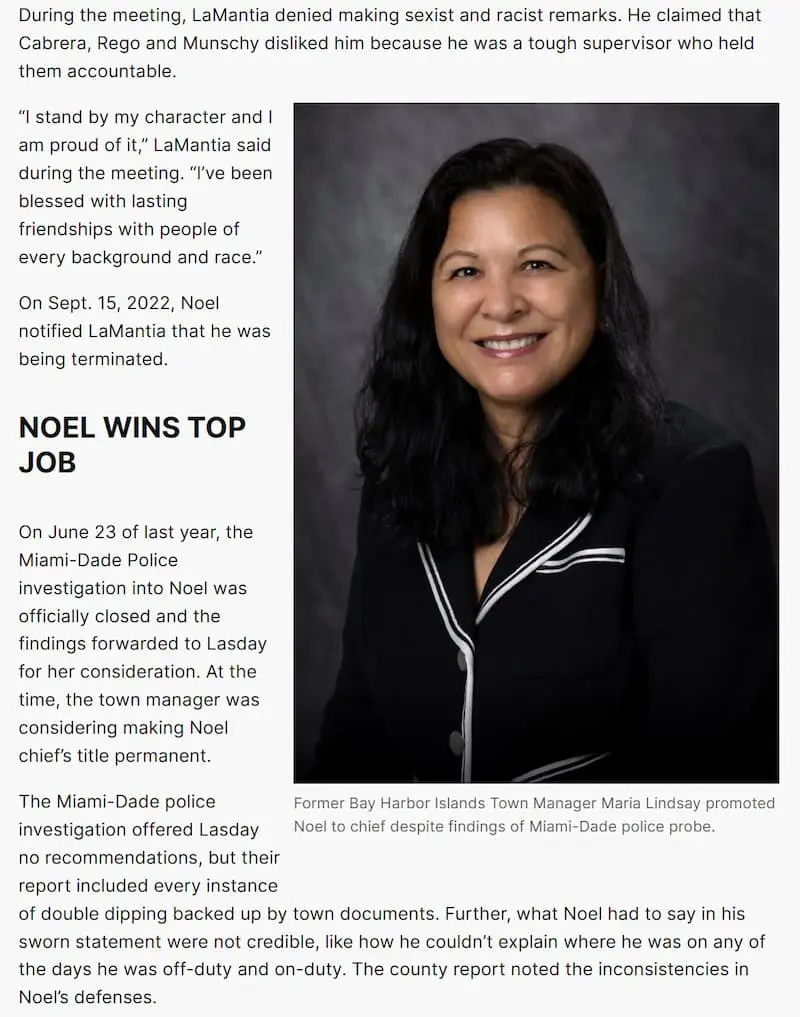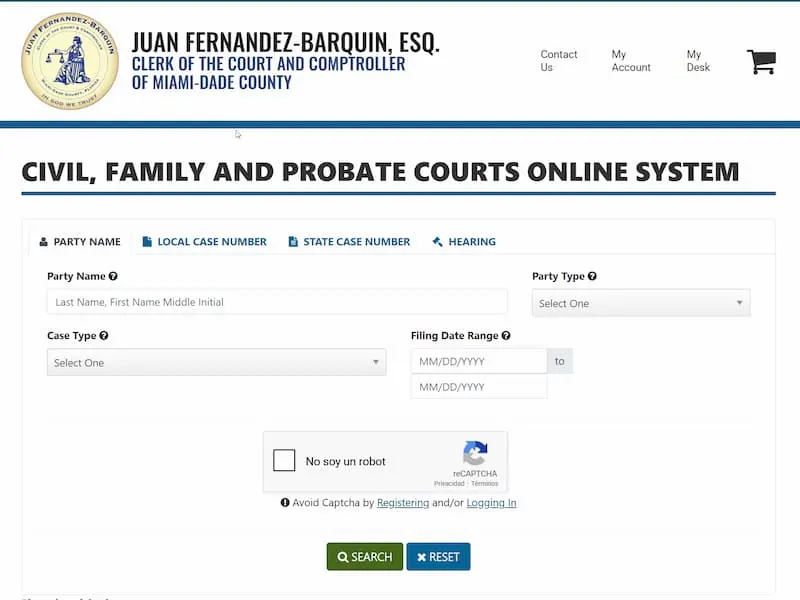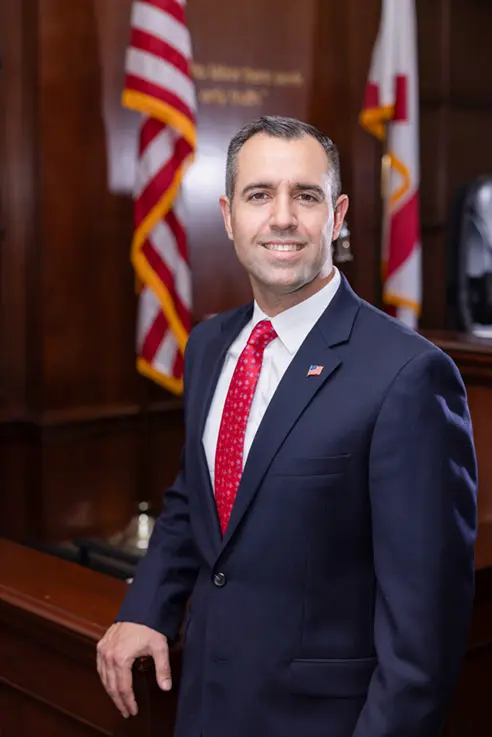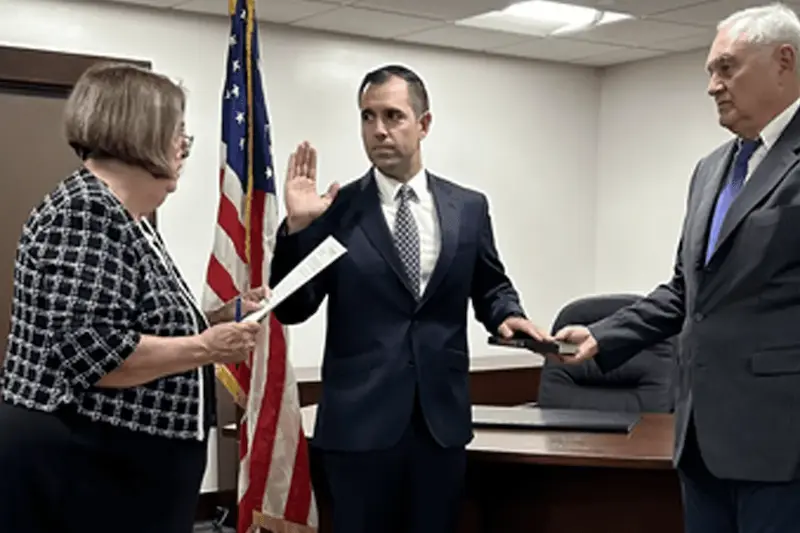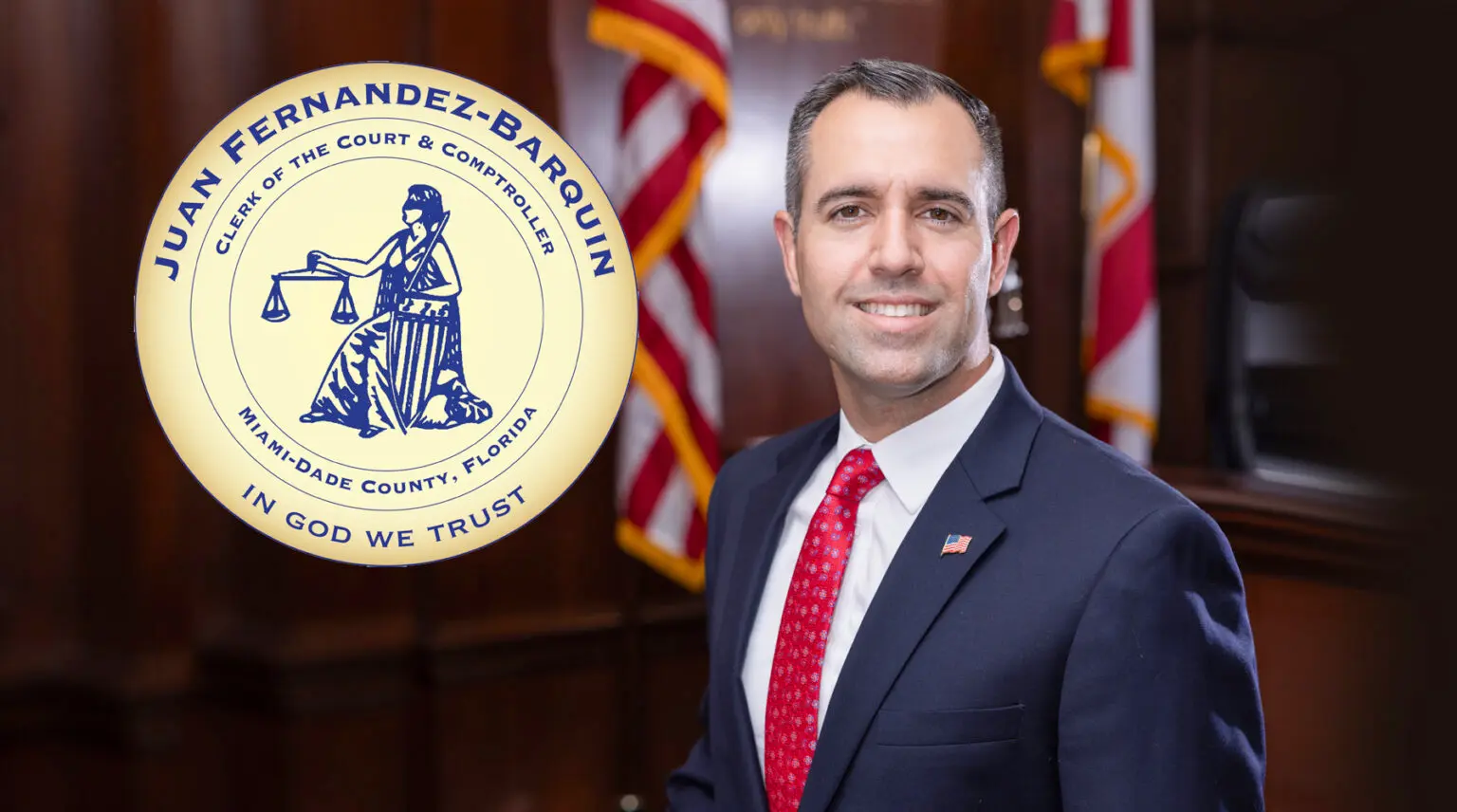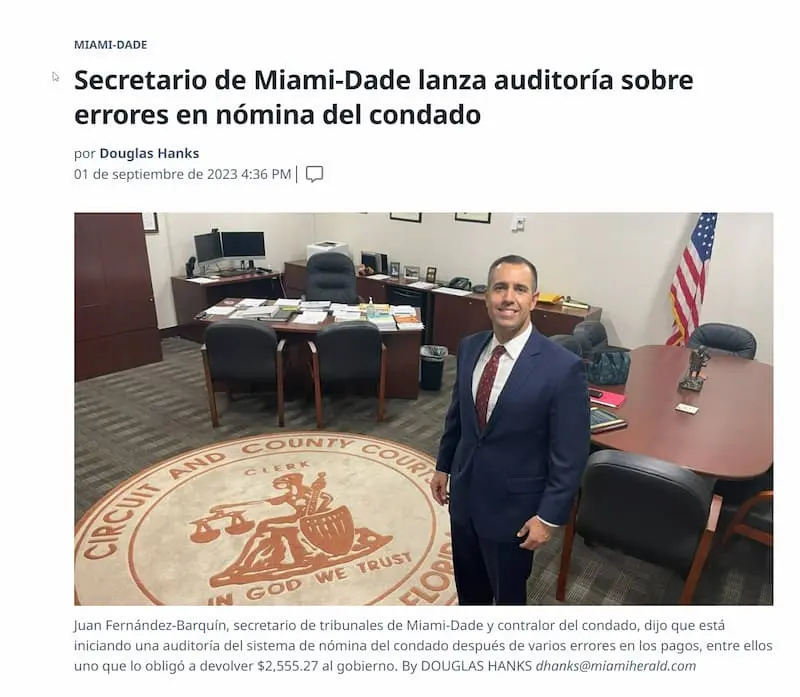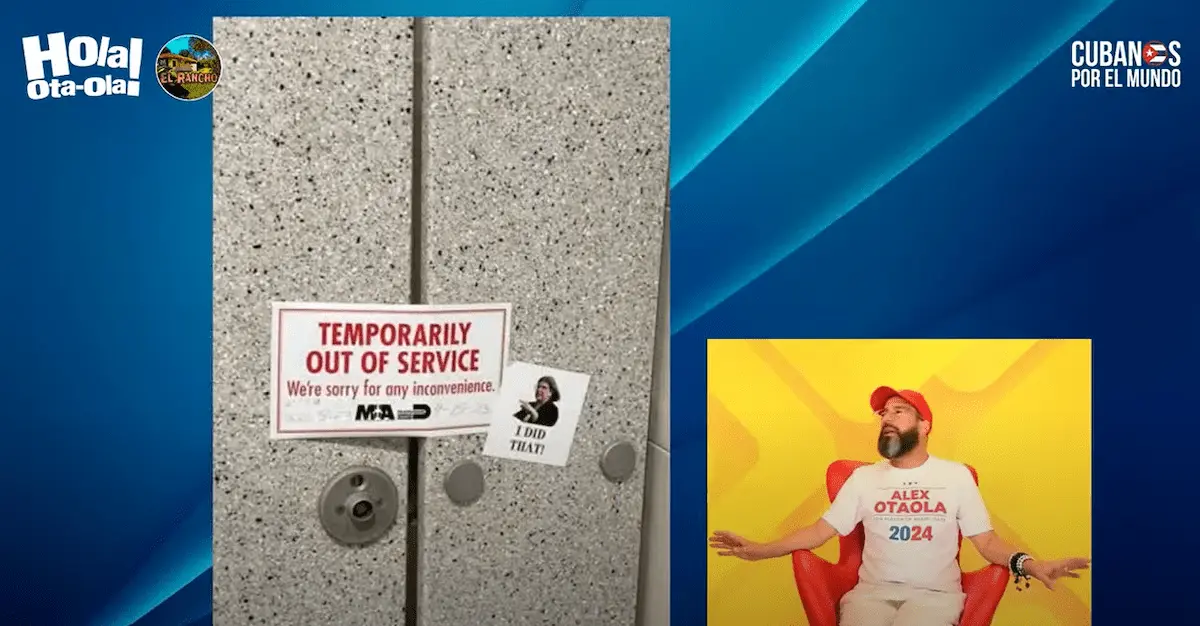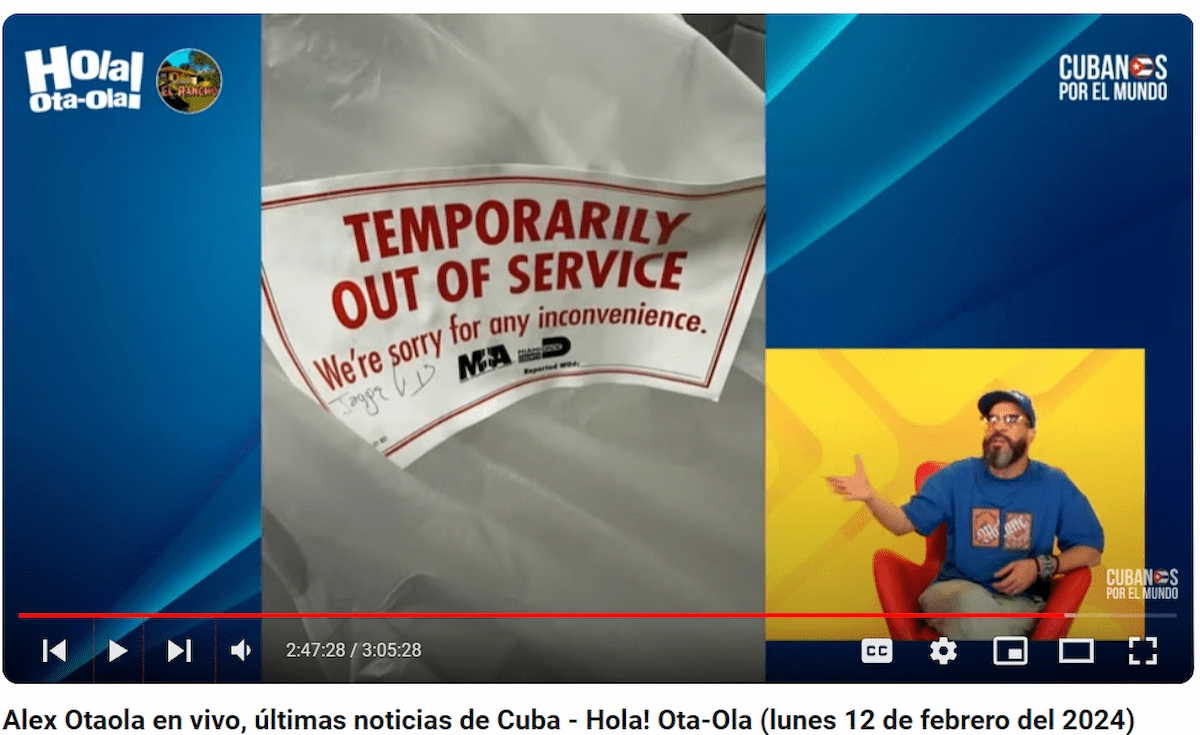|
Getting your Trinity Audio player ready... |
Tabla de Contenido/ Table of Contents
- 1 Miami-Dade Exposes Systemic Oversight Failures: Questionable Cases of Control and Surveillance
- 1.1 County Under Scrutiny
- 1.2 Case 1: Bay Harbor Islands and the Police Chief with Double Payments
- 1.3 Case 2: Miami-Dade and the INFORMS Payroll Disaster
- 1.4 Miami-Dade Exposes Systemic Oversight Failures
- 1.5 Whistleblowers and Retaliation: A Recurring Theme
- 1.6 Reform or Simulation? Has Miami-Dade Learned from Its Mistakes?
Miami-Dade Exposes Systemic Oversight Failures: Questionable Cases of Control and Surveillance
County Under Scrutiny
Miami-Dade, Florida’s most populous county, faces a credibility crisis in its government oversight mechanisms. From recurring payroll errors to controversial promotions in law enforcement agencies, an investigation by NewsMiamiDade.com reveals a pattern of systemic failures that compromise transparency, public fund usage, and citizen trust. These are the emblematic cases that expose cracks in accountability.
Case 1: Bay Harbor Islands and the Police Chief with Double Payments
Key Findings:
- Lindsley Noel, police chief, promoted in 2023 despite a Miami-Dade Police investigation documenting 50+ cases of “double payment” (2017-2019), where he received his public salary and external payments during overlapping hours.
- Suspicious Adjustments: Modified payroll records 100 times after the irregularities were discovered.
- Institutional Response: A private report, commissioned by former administrator Maria Lasday, downplayed the findings. The Town Council approved his promotion with a 36% salary increase ($196,117 annually).
Oversight Failures:
- No county entity intervened to audit the case, despite Miami-Dade Police alerts.
- Whistleblower Retaliation: Sergeant Michael LaMantia, who exposed the case, was fired and later reinstated after a legal battle.
Bay Harbor Islands Police Chief Promoted Amid ‘Double Payment’ Scandal Controversy
Whistleblower Lawsuit and Miami-Dade Investigation Expose Systemic Oversight Failures
Despite a Miami-Dade Police investigation that documented more than 50 cases of “double payment” and ethical violations, Bay Harbor Islands Police Chief Lindsley Noel was promoted to the department’s top position in 2023, backed by a controversial analysis from a private investigator that minimized the findings. The controversy, brought to light through a lawsuit under Florida’s Whistleblower Act, raises questions about accountability and transparency in the governance of this small coastal town.
Double Payment Allegations
A 93-page Miami-Dade Police report revealed that between 2017 and 2019, then-Captain Noel earned at least $36,750 from off-duty security work while simultaneously receiving his $143,932 annual salary for on-duty shifts. Noel, responsible for assigning off-duty details, allegedly exploited his position to assign himself lucrative roles during hours he was already being paid for on-duty work.
Despite the evidence, Miami-Dade prosecutors declined to file criminal charges, citing insufficient proof of intent. Noel denied any wrongdoing, calling the investigation a “political witch hunt” and arguing that his payroll records were inaccurate.
Whistleblower Retaliation
The scandal emerged through a lawsuit filed by Sergeant Michael LaMantia, who helped initiate the investigation in 2020. LaMantia claims he was unjustly fired in 2022 as retaliation for his role in exposing Noel’s misconduct. Although LaMantia faced his own internal investigation in 2022—accused of harassment and racist comments—an arbitrator reduced his punishment to a one-year suspension, calling the termination disproportionate. LaMantia denies the accusations, labeling them a smear campaign to protect Noel.
A Questionable Promotion
In June 2023, then-town administrator Maria Lasday, dissatisfied with Miami-Dade’s findings, hired private investigator Patrick Franklin (a former Miami Beach officer) to reevaluate the case. Franklin’s report criticized the original investigation for lack of oversight and labeled Noel’s payroll adjustments as “unusual but not illegal.” Based on this analysis, the Bay Harbor Islands Town Council voted 4-1 to promote Noel to chief in August 2023, approving a $196,117 salary and a $75,000 settlement for Noel’s EEOC complaint of racial discrimination during the investigation.
Systemic Failures and Public Trust
Critics argue that the town prioritized image over accountability:
- Warnings Ignored: The Miami-Dade report highlighted Noel’s inconsistent defenses, including his inability to justify his whereabouts during disputed shifts.
- Private Investigator Bias: Franklin’s analysis omitted key evidence, such as Noel’s failure to pay required surcharges.
- Lack of Transparency: Mayor Joshua Fuller and council members declined to comment, fueling perceptions of a cover-up.
Community Implications
With fewer than 6,000 residents, Bay Harbor Islands presents itself as a close-knit community, but this case exposes deeper issues:
- Ethical Oversight: Noel’s promotion despite sustained policy violations undermines public trust.
- Whistleblower Retaliation: LaMantia’s case highlights the risks employees face when reporting misconduct.
- Costs to Taxpayers: Noel’s settlement and salary increase, along with legal expenses from lawsuits, strain municipal resources.
A Test of Governance
As Chief Noel leads a department mired in controversy, residents question whether local officials value loyalty over integrity. For Sergeant LaMantia, the fight continues: “This isn’t just about me; it’s about ensuring no one else is silenced for doing the right thing.”
The Bay Harbor Islands Town Council and Chief Noel have yet to respond to repeated requests for comment.
Sources: Miami-Dade Police investigation reports, court documents, Bay Harbor Islands public records.
Investigative reporting by Francisco Alvarado for Floridabulldog.org. Follow updates.
Case 2: Miami-Dade and the INFORMS Payroll Disaster
Key Findings:
- The INFORMS software system, purchased for $66 million in 2018, generated massive overpayments to employees, including County Comptroller Juan Fernandez-Barquin ($2,555 returned).
- Unresolved recurring errors, such as inflated salaries for commissioners, have persisted for years.
Oversight Failures:
- Lack of Proactive Audits: The county failed to detect the errors until employees and media exposed them.
- Technological Opacity: INFORMS remains without an independent public evaluation despite its financial impact.
Miami-Dade Case: A $66 Million Software and Phantom Payments
County Clerk and Comptroller Juan Fernandez-Barquin announced a payroll system audit in September 2023 after massive overpayments linked to INFORMS, a software platform implemented in 2018 to modernize accounting, procurement, and payroll. Findings include:
- Overpayments to hundreds of employees, including Fernandez-Barquin himself, who returned $2,555.27 after receiving improper funds.
- Critical failures in INFORMS, acquired for $66 million, which failed to effectively replace outdated systems.
- Unresolved prior errors, such as excessive salaries for county commissioners, now amplified by the new technology.
“As the steward of county finances, it is my duty to ensure that every dollar is used appropriately,” said Fernandez-Barquin, appointed by Governor Ron DeSantis in June 2023 and confirmed in the 2024 elections.
Case 3: Cleaning Crisis at Miami International Airport (MIA)
Key Findings:
- C&W Services, responsible for cleaning MIA for over 20 years, admitted that current airport cleanliness is subpar despite receiving $34 million annually.
- The company repeatedly requested additional funding from the county to hire more cleaning staff due to rising passenger numbers, but these requests were denied.
- A Miami-Dade County Commission committee voted on February 12, 2025, to replace C&W Services with two new contractors (ABM from New York and Flagship from Dallas) under a 5-year, $261 million contract, with an annual $52 million budget for cleaning.
Management Failures:
- C&W Services offered to replace broken paper towel dispensers at no cost, but county procurement rules required a bidding process, delaying improvements.
- The inflexible 2019 contract prevented adjustments to cleaning staff despite a 16% increase in passenger traffic since 2019, reaching 52 million users in 2023.
- Images shared by Commissioner Kevin Cabrera, such as a six-inch dust strand hanging from a restroom sprinkler, highlighted poor cleaning conditions during a surprise inspection.
Institutional Response:
- Mayor Daniella Levine Cava pushed for a new contract allowing budget adjustments based on passenger flow and has implemented “Lightning Teams” for rapid repairs and cleaning improvements.
- Aviation Director Ralph Cutié defended the new contract, ensuring greater flexibility and efficiency in facility maintenance.
- Kevin Cabrera, committee chair, supported the termination of C&W before resigning to become Donald Trump’s ambassador to Panama, citing passenger dissatisfaction reflected in social media posts and formal complaints.
Case 4: Miami-Dade and the Erroneous Payments to a Commissioner
Key Findings:
- Roberto J. Gonzalez, District 11 commissioner, received an additional $1,000 per week for 8 months due to an error in the county’s payroll system.
- $34,000 in Overpayments: A payroll employee forgot to mark a one-time allowance as completed, generating recurring improper payments since December 2022.
Audit Failures:
- The Human Resources Department admitted that review protocols failed to detect the error, despite public records showing salary discrepancies ($5,500 biweekly vs. $3,500 for other commissioners).
Institutional Response:
- Gonzalez, who reported an annual income of $188,000 as an attorney, will be required to reimburse the amount.
- Melanie McLean, Deputy Director of Human Resources, announced the creation of “exception reports” to identify similar errors, though without clear deadlines.
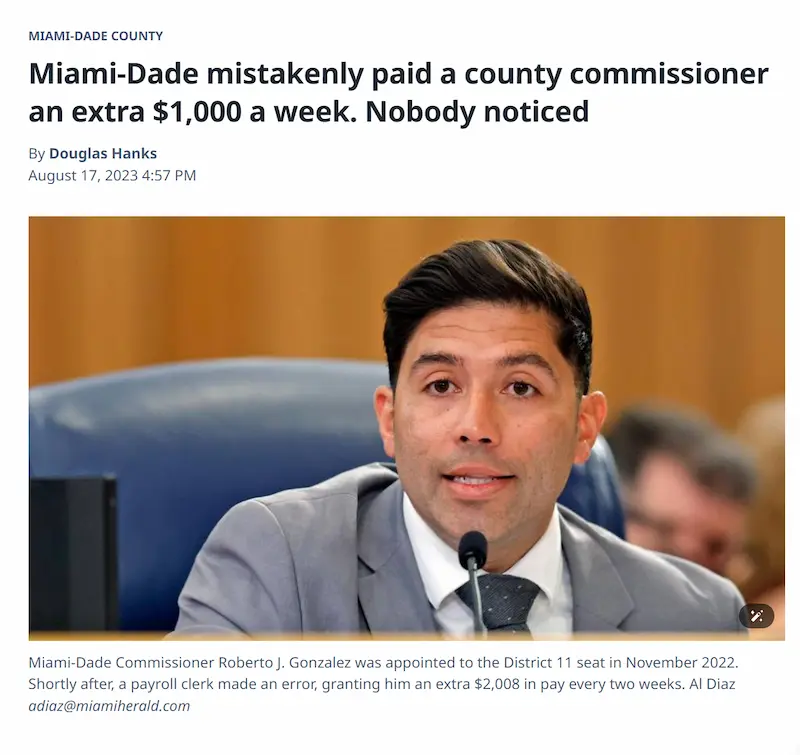
From County to Federal Level: How Do Government Oversight Mechanisms Fail?
Federal Context: Musk’s Measures and the DOGE to “Optimize” Oversight
In February 2025, Elon Musk, serving as an advisor to the Department of Government Efficiency (DOGE), reported $50 billion in fraudulent annual payments in social benefits to individuals without Social Security numbers or valid IDs. To combat this, he proposed key measures:
- Mandatory Justification: Every government payment must include an explanation in the comments field (currently left blank).
- Categorization Codes: Clear tags for financial audits, avoiding blank fields.
- Weekly Updated Lists: Of fraudulent entities, deceased individuals, or those linked to terrorism.
However, a federal judge blocked DOGE’s access to Treasury systems after a lawsuit by unions and retirees over privacy risks, according to Bloomberg. Musk called this a “brake on transparency.”

Miami-Dade Exposes Systemic Oversight Failures
Common Patterns: Faulty Technology and Opacity
Both cases share troubling traits:
- Defective IT Systems:
- Miami-Dade: INFORMS, a multi-million-dollar investment, generated erroneous payments and failed to resolve historical issues.
- Bay Harbor Islands: Payroll software allowed Noel to alter records without automatic audits.
- Lack of Accountability:
- Bay Harbor: Authorities ignored a 93-page Miami-Dade Police report and prioritized a biased private analysis.
- County Level: INFORMS errors persisted for years without effective corrections.
- Costs to Taxpayers:
- Miami-Dade: Overpayments, legal costs, and an emergency audit drain public resources.
- Bay Harbor Islands: Secret settlements ($75k to Noel) and inflated salaries burden residents.
Whistleblowers and Retaliation: A Recurring Theme
- Bay Harbor: Sergeant Michael LaMantia was fired after exposing Noel’s double payments, though an arbitrator reversed the decision for “clear retaliation.”
- Miami-Dade: INFORMS errors came to light after years of unaddressed internal complaints, according to reports from El Nuevo Herald.
Reform or Simulation? Has Miami-Dade Learned from Its Mistakes?
The Bay Harbor Islands, INFORMS, and other cases reveal that the county and its cities operate with a political survival manual, not one of ethical governance. While officials like Fernandez-Barquin promise corrections, the public demands action, not promises. As one resident told NewsMiamiDade.com: “The problem here isn’t the failures, it’s who covers them up.”
Will this be the moment for real change? The answer depends on whether leaders prioritize the public interest or the status quo.
These cases are not isolated incidents but symptoms of a culture of impunity and poor management in Miami-Dade’s public administration. While Fernandez-Barquin promises “full transparency” in his audit, and Bay Harbor remains silent on criticism, taxpayers demand:
- Independent external audits in cases of conflict of interest.
- Clear sanctions for officials who manipulate payroll or cover up irregularities.
- Investment in reliable systems, not faulty software or “lukewarm” reports.
As summarized by an anonymous county employee: “The problem here isn’t technology, it’s the will to do things right.”
As NewsMiamiDade.com puts it: “Without controls, even the best intentions — like Musk’s — get lost in the maze of bureaucracy.”
Sources:
- El Nuevo Herald: Miami-Dade payroll errors.
- Miami-Dade Police reports (Noel case).
- Miami-Dade County internal audits (INFORMS).
- Florida Bulldog: Bay Harbor Islands police chief promoted to top spot despite ‘double-dipping’ findings by Miami-Dade police.
- Miami-Dade clerk launches audit of county payroll errors – elnuevoherald.com.
- Musk reports ‘fraudulent’ payments in the Treasury Department.
- Miami-Dade mistakenly paid a county commissioner an extra $1,000 a week. Nobody noticed.
Want more post like this?
Head over to our homepage for the latest updates from South Florida and beyond:





